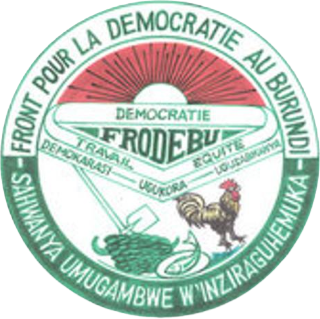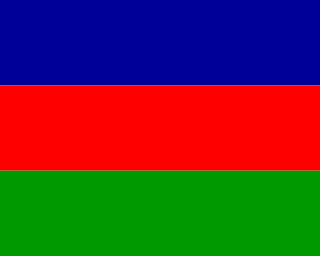This article needs additional citations for verification .(November 2024) |
 |
|---|
The Independent Labor Party (PIT) is a small, predominantly ethnic Tutsi political party in Burundi.
It was founded in 1993. [1]
This article needs additional citations for verification .(November 2024) |
 |
|---|
The Independent Labor Party (PIT) is a small, predominantly ethnic Tutsi political party in Burundi.
It was founded in 1993. [1]

Burundi originated in the 16th century as a small kingdom in the African Great Lakes region. After European contact, it was united with the Kingdom of Rwanda, becoming the colony of Ruanda-Urundi - first colonised by Germany and then by Belgium. The colony gained independence in 1962, and split once again into Rwanda and Burundi. It is one of the few countries in Africa to be a direct territorial continuation of a pre-colonial era African state.

The Front for Democracy in Burundi is a political party in Burundi.

This article lists the prime ministers of Burundi since the formation of the post of Prime Minister of Burundi in 1961 until the present day. The office of Prime Minister was most recently abolished in 1998, and reinstated in 2020 with the appointment of Alain-Guillaume Bunyoni.

The Union for National Progress is a nationalist political party in Burundi. Initially it emerged as a nationalist united front in opposition to Belgian colonial rule but subsequently became an integral part of the one-party state established by Michel Micombero after 1966. Dominated by members of the Tutsi ethnic group and increasingly intolerant to their Hutu counterparts, UPRONA remained the dominant force in Burundian politics until the latter stages of the Burundian Civil War in 2003. It is currently a minor opposition party.

The National Council for the Defense of Democracy – Forces for the Defense of Democracy is the major political party in Burundi. During the Burundian Civil War, the CNDD–FDD was the most significant rebel group active and became a major political party in Burundi. The party's rule has been described as authoritarian.

The Party for National Recovery is a minor political party in Burundi. It was founded in May 1994 by the former president Jean-Baptiste Bagaza. Bagaza, an ethnic Tutsi, had established a military dictatorship in Burundi from 1976 until his deposition in 1987, after which he lived in exile. He was allowed to return to the country during its democratization under Pierre Buyoya after 1992.

The Movement for the Rehabilitation of Citizens–Rurenzangemero is a political party in Burundi. It is currently led by Epitace Banyaganakandi.

The Rally for the People of Burundi is a political party in Burundi. It was headed by Ernest Kabushemeye, until his assassination in 1995, since when Balthazar Bigirimana has been party leader.

The Party for the Economic Independence of Burundi (PIEBU) is a small political party in Burundi.

The Party for the Integral Renewal of Burundi-Intahemana (PARIBU-Intahemana) is a small political party in Burundi.

The People's Reconciliation Party is a minor political party in Burundi.

The People's Party was a small political party in Burundi led by Shadracik Niyonkuru.

Kaze-Forces for the Defense of Democracy, also known by its abbreviated form KAZE-FDD, is a small, predominantly ethnic Hutu political party in Burundi. It is led by Jean-Bosco Ndayikengurukiye. The Kaze-FDD used to be a faction of the CNDD-FDD.

The National Council for the Defense of Democracy is a political party in Burundi.

A constitutional referendum was held in Burundi on 28 February 2005. The new constitution was approved by 92% of voters.

Burundi, officially the Republic of Burundi, is a landlocked country in the Great Rift Valley at the junction between the African Great Lakes region and Southeast Africa, with population of over 14 million people. It is bordered by Rwanda to the north, Tanzania to the east and southeast, and the Democratic Republic of the Congo to the west; Lake Tanganyika lies along its southwestern border. The capital city is Gitega and the largest city is Bujumbura.
These are some of the articles related to Burundi on the English Wikipedia:
The Free Socialist Party of Burundi was a political party in Burundi. Parsocilibre was founded in March 1961. It was led by Michel Buyoya and Pascal Baranyikwa. The party supported constitutional monarchy. It had its office in Kayanza.
Capital punishment was abolished in Burundi on 24 April 2009. Burundi is not a state party to the Second Optional Protocol to the International Covenant on Civil and Political Rights. The last legal execution in Burundi took place in 1997.